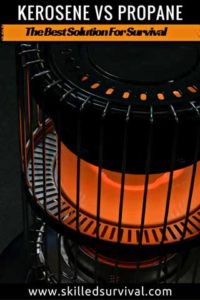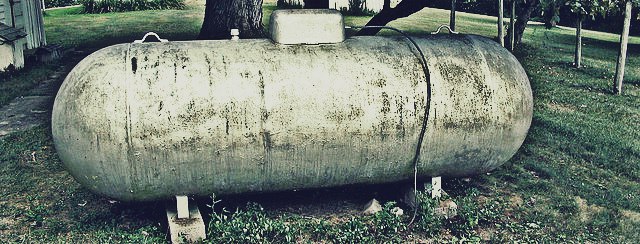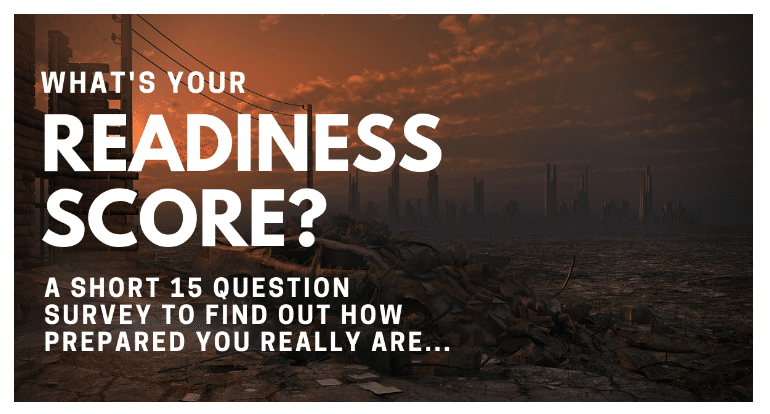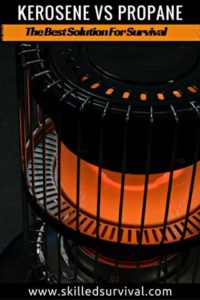
And all the follow-up questions such as:
- Which is the better investment for heating?
- Which is best for long-term survival?
- What are the pros and cons of each?
On the morning I wrote this article it was a bitter 10 degrees Fahrenheit outside.
It was so cold that morning; my labrador retriever refused to brave it.
Deciding to take a pass and “hold it,” in hopes of a warm-up.
He was disappointed…
Yet I was comfortable, typing away at my computer keys and sipping a warm coffee in my warm 71 degrees home.
It’s times like these that I realize just how fortunate we are today. Heating, indoor plumbing, motor vehicle transportation, refrigeration…it’s amazing.
I try not to take it for granted…
That’s why I often wonder what life would be like without these modern conveniences. The easiest way to imagine this is to think about our electrical grid going down for an extended period.
Let’s just pretend it goes down for a week in the dead of winter. What would that be like? How would you handle that situation?
What’s your plan B?
And it’s not that hard to imagine because every winter it happens to millions of people around the world.
So it’s your responsibility as a self-reliant adult to have a backup heat source strategy. Now, maybe you already have a fireplace or woodstove, or tent stove. Great!
If this is you, then you already have an excellent backup heat source as long as you have a large pile of seasoned firewood.
But not everyone has an expensive wood stove, or maybe you’d prefer to have multiple backup options. Some people attempt to build cheap clay pot candle heaters but they’re only a short-term fix at best.
The bottom line is:
Heat (or more accurately lack of heat) is a major concern for our health and well-being.
That’s why you should consider getting a backup kerosene or propane heater.
Storing Fuel for Preppers
With propane or kerosene heaters, you’ll be able to supplement a mobile heat source for special situations such as heating specific rooms that tend to be cooler, heating garages when working on a vehicle in the winter, etc.
Another use for mobile propane or kerosene heaters is to use them to heat an RV or your tent for camping in the cooler seasons.
And if you’re considering living off the grid, you’ll need to think carefully about all your heating options from cost to reliability.
Finally, running a supplemental heater on cold days can is often more cost-effective when heating your home as opposed to cranking up your fancy thermostat.
And the two best fuels to consider for backup heat generation are kerosene and propane.
Now, some people will argue the merits of electrical heaters, but those rely on the power grid, so I tend to immediately discount that option. You want to diversify your heating fuel sources for emergency situations, and that’s propane or kerosene.
But which is best? Which type of heater should you buy? The honest answer depends on what you are trying to accomplish. So before we can figure out which one’s the best for you, we need to break down the pros and cons of each fuel.
To do that, let’s cover the following three categories:
- Availability
- Price
- Storage / Safety
Are You Ready For The Tough Times Ahead? Take My 60 Sec Quiz To See If You’re Part Of ‘The Fragile Masses’ Or Not… Start Quiz Now!
Propane Vs Kerosene Pros and Cons
1. Availability Of Propane Vs Kerosene
If you can’t find where you live, then what’s the point?
Kerosene
You can purchase small tanks of kerosene from places like home improvement stores and camping stores, but these small tanks are a poor financial deal.
To find the best deal (i.e. best price) on kerosene, you should look for a nearby gas station with a kerosene pump.
In some locations in the States, this might not be a readily available option. So do some research online using google maps or forums and find out where your nearest kerosene pump is located.
If you’re a long way away from a kerosene pump, you can either stock up the next time you’re there or choose a propane heater instead.
Here’s a post that lists gas stations that sell Kerosene (and the ones that do not).
Propane
For the most part, propane tanks are more readily available for purchase or rental than kerosene. The main reason is the popularity of using propane for gas grills.
So many home improvement, grocery stores, convenience stores, etc. have propane tank rental programs. But this option is not ideal for large-scale storage.
Plus, to get better pricing on propane, you’ll want to buy your propane in bulk. To do that you’ll need a large propane tank to store it (more details shortly).
So you’ll want to call your nearest propane delivery company and see if they service your area. Oh, and while you have them on the phone, get an updated bulk rate price…
2. Kerosene Vs Propane Prices
In general, the economic laws of supply and demand determine the price of fuels. They are not stable and go up and down.
The current price of these fuels on the date of writing this post is as follows:
- Kerosene – $5.93/gallon (updated 3/08/2023)
- Propane – $3.50/gallon (updated 3/08/2023)
Note: Prices will vary based on your local, so make sure you check your residential prices for accurate comparison information.
So on a per-gallon basis, propane seems like the obvious winner. But that’s only the first part of the story. The price per gallon matters but what REALLY matters is the Cost Per BTU.
This is because 1 gallon of kerosene has a different amount of potential energy than 1 gallon of propane. So we must take this energy potential into account to figure out which one is the better value.
- Kerosene has roughly 135,000 BTUs of energy potential per gallon
- Propane has roughly 91,333 BTUs of energy potential per gallon
So now we can figure out the figure that matters; Price Per BTU. So with simple math (divide the price by the BTUs and times that by 1000).
- Kerosene – $0.0439 per 1,000 BTUs of energy
- Propane – $0.0383 per 1,000 BTUs of energy 22779 26109
So there we have it; currently (3/08/2023) you get 14.6% more BTUs of energy for your dollar with Propane than you do with Kerosene.
But again, prices vary, and you should check the local kerosene pump prices and call your nearest propane vendors to get actual per-gallon prices for your specific area.
Over the years, the “Better Deal” has flipped back and forth depending on supply and demand.
But you’ll need to do that math yourself on the day your read this.
3. Storage Life / Safety Of Propane Vs Kerosene
Kerosene is one of the safer liquid fuels to store and use. The biggest reason for this it’s much less explosive than other popular fuels (i.e. gasoline).
In general, Kerosene requires a wick for it to ignite. So if you light a match and drop it directly into a bottle of kerosene, it won’t ignite, unlike gasoline which will explode.
KeroHeat Off-Grid Heater Review
Another benefit to kerosene is how long it keeps in storage. When it comes to a backup fuel source, I’m a fan of stockpiling.
But with many fuels, it’s a challenge to store them long-term. Which means you have to annually add additives or rotate. But with kerosene as long as you store it in a quality container and it will be useful for years or even decades.
The best way to store a large amount of Kerosene is to get a few large 50-gallon drums (like this one) with good clamp seals. You may also want to put these drums into a secondary containment trough for any drips or leaks.
Another consideration with kerosene is that even in 50-gallon barrels, you’ll still be able to haul it. If you plan to bug out, this might be an important aspect.
Sure, you’ll need a truck bug out vehicle or a survival trailer, but it CAN be done.
Exclusive Bonus Content – Skilled Survival’s 104 Item Bug Out Bag Checklist – the only bug out checklist worth using. Click Here To Get Your FREE Copy Of It.
If you only plan on storing a limited amount of propane you might be able to get away with purchasing a few smaller 11 lb. propane tanks.
However, if you want to store large amounts of propane, then you’ll want a large propane tank. That’s what those large metal tanks are you often see in the yards of many old farmhouses in the Midwest.
They are bulk propane storage tanks and they are an excellent way to store a lot of propane safely.
While propane is a gas and its fumes are very flammable, if it’s stored in a large propane tank then it’s safe. The tank and valves are designed to store large amounts of propane above ground in your backyard. It’s low risk.
And the propane will keep indefinitely as long as the tank and valves are in good shape. But that’s the rub; large-scale propane tanks are not cheap.
And used tanks may or may not be in good enough shape to trust.
Another downside of a large propane tank is that it’s not mobile. If you plan to bug out when things go south, then a large propane tank would not be a good investment for your long-term survival plan.
So again, it depends on what your survival goals are, but both kerosene and propane are solid long-term options for survival.
As A Way To Introduce You To Skilled Survival, We’re Giving Away Our #78 Item Complete Prepper Checklist. Click Here To Get Your FREE Copy Of It.
Kerosene vs Propane Heaters
So next I’m going to try to steer you in the direction of what your best emergency heating fuel is and then share with you one kerosene and one propane heater I recommend.
If your goal is to have a backup heat source for prolonged power outages (or supplement heat) for your home (and don’t already own a large propane storage tank), then I believe you should go with kerosene.
It’s relatively straightforward to store; it lasts a long time; it’s a safe fuel to use, and it’s reasonably priced. Even if it’s not readily available near your location, you can plan an occasional trip to a kerosene pump and load up as needed.
However, propane is also an excellent choice for prolonged power outages and energy backup. But you’ll need to invest in a large propane tank to store it at scale. But if you already own one, or can get one at a good price, then propane is a solid way to go.
The bottom line:
You should investigate your personal availability of both fuels and your storage options. The good news is whichever you ultimately decide you really can’t go wrong.
For some, kerosene will make more sense, but for others, propane is the way to go. The key is for YOU to do a bit of research to decide which is right for YOU.
Best Kerosene Heater For Your Money
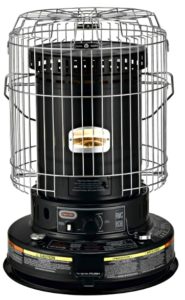
- Heats up to 1,000 square feet
- Dependable – Ideal for emergency use or daily use
- Economical – Cut heating bills by warming only occupied areas
- Convenient – Easy to use automatic ignition and one-touch shut-off
- Safe – Built-in safety switch shuts off power if the unit gets knocked over
This kerosene heater will heat up to 1,000 square feet for 8 to 12 hours using less than 2 gallons of kerosene.
It’s a top-of-the-line kerosene heater that’s hard to beat at this price.
Here’s some more information on this kerosene heater:
KeroWorld indoor convection heater
Best Propane Heater For Your Money
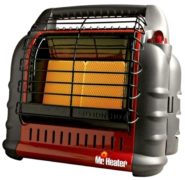
While a single one won’t heat as much square footage as the kerosene heater above, it puts out good heat for a small home propane heater.
Perfect for single-room heating as appose to heating an entire home. Here are a few more of its key features:
- Swivel regulators with a single control, Length 19.00, Width 12.00
- Automatic low oxygen shutoff system
- Accidental tip-over safety shutoff
- Heats up to 450 square feet
- Low, medium, and high control knob for steady temperatures
- Easy-carry handle with a built-in blower fan to circulate heated air for higher heating efficiency
- Heavy-duty wire guard for added tile protection and rugged durability when traveling
- Four-position heat control with built-in Piezo ignition –pilot/low/med/hi
- Low-oxygen safety shut-off (ODS) and tip-over safety shut-off
- Dual ceramic burner tiles with shock-absorbing insulation
- Hose storage bag for convenient storage of optional connection hoses up to 12 feet long
- The blower fan operates on 4D-cell batteries or with an optional 6-volt A/C adapter (Not Included)
- Porcelain-coated reflector added for extended life
- Swivel regulator mount
- Attached swing-open cylinder hatch doors
The bottom line is this is a top-of-the-line propane heater at this price.
Here’s some more information on this propane heater:
Gear Review: The Mr. Heater Big Buddy!
Prepare, Adapt, and Overcome
“Just In Case” Jack
P.s. Are you ready for the tough times ahead?
Find out now by taking my short Readiness Score Quiz – it’s absolutely free.
Once complete, you’ll know exactly where you stand on the “fragile” vs.” resilient” spectrum.
So click here to start the Quiz….And don’t worry; the questions are so easy a 3rd grader could answer them.
Click on the image to begin the Quiz and find out once and for all if you’re part of “The Fragile Masses” or “The Resilient Few.”
The post Kerosene Vs. Propane Heaters For Winter Power Outages appeared first on Skilled Survival.


